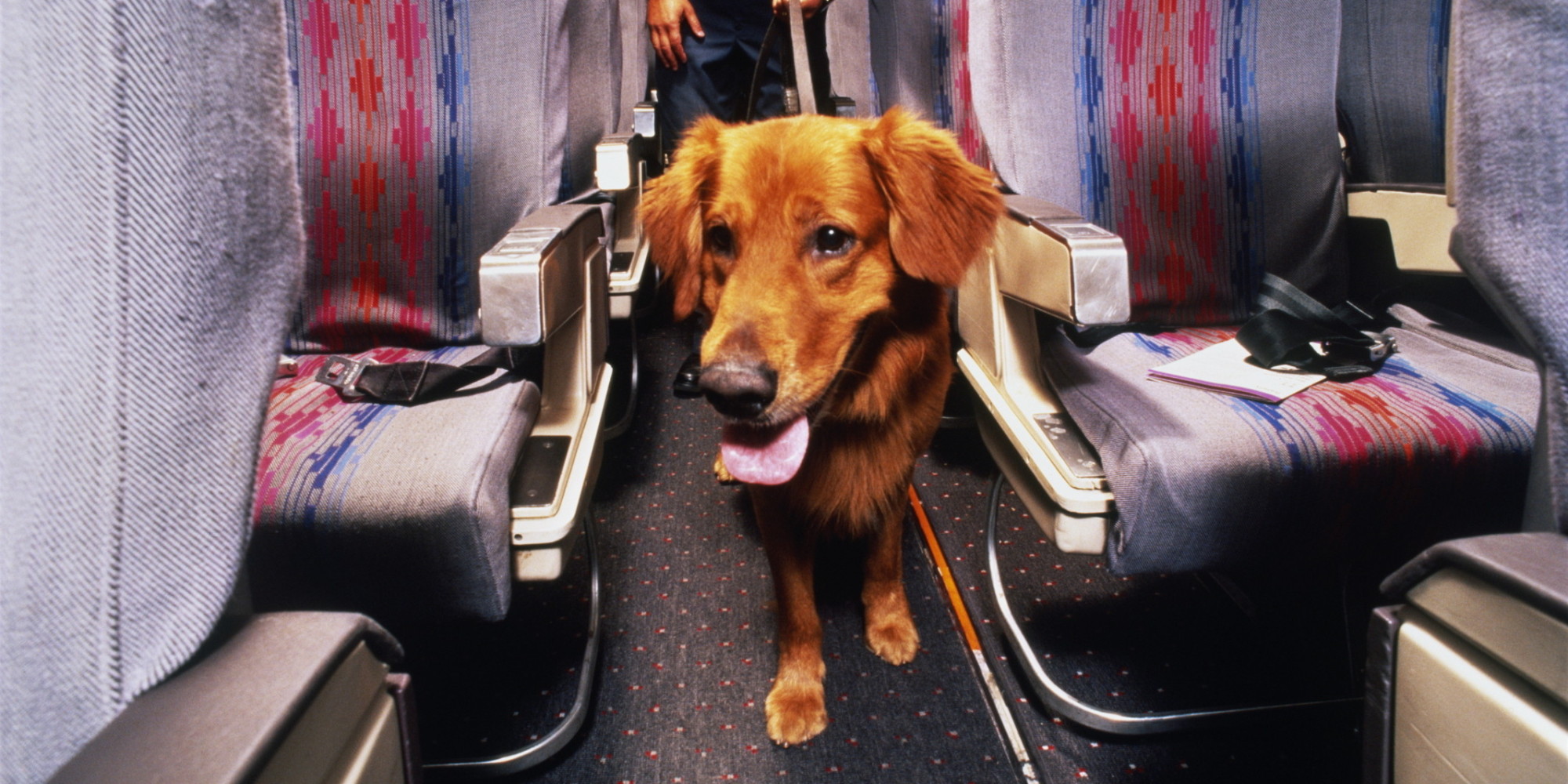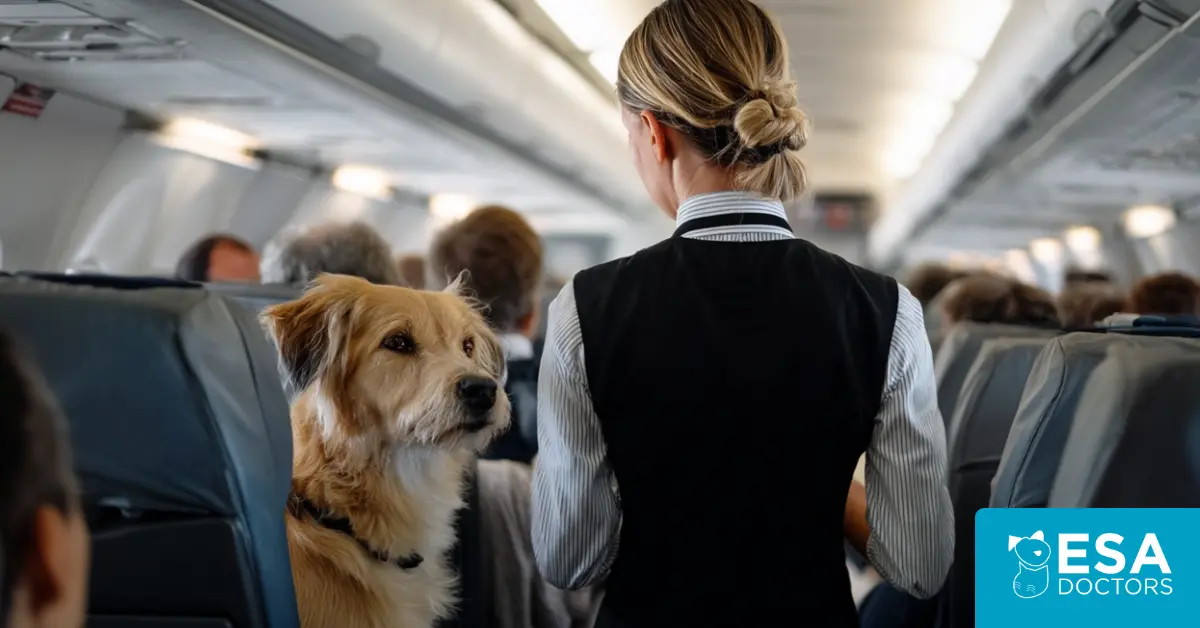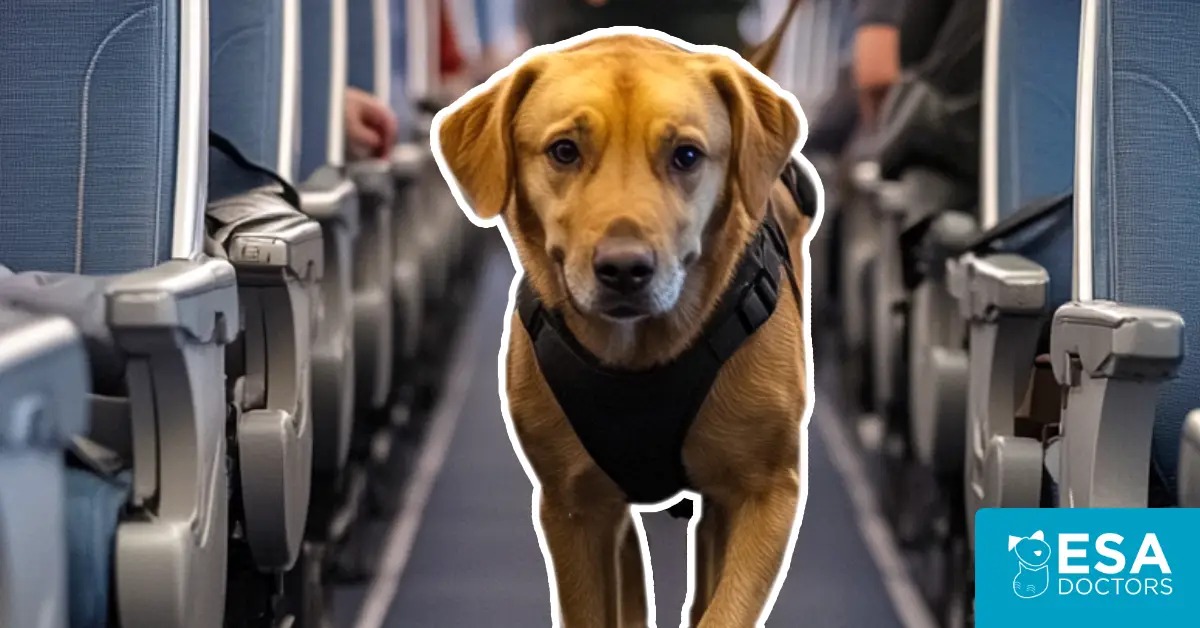On December 2nd, 2020, the U.S. Department of Transportation (DOT) announced it had finalized rules that will allow airlines to treat emotional support animals as ordinary pets. Passengers who own service dogs will still be able to board flights free of charge, as long as they complete newly adopted federal forms.
These new rules will take effect 30 days from the date they are officially published in the Federal Register. This means that the rules may take effect as soon as January 2021, but airlines will still be required to accommodate emotional support animals throughout at least January 9th, 2021.
In this article, we will discuss what this means in practical terms for ESA owners, the future of ESAs on flights and the implications for owners of service dogs.
- What is changing because of these new rules?
- Am I currently able to travel with my ESA?
- What happens after the new DOT rules go into effect?
- What if I have a service dog?
- Is an emotional support animal a service dog?
- What does the future hold for emotional support animals?
1. What is changing because of these new rules?
Under the existing rules for ESAs on flights, airlines must accommodate emotional support animals if the passenger has documentation from their licensed mental health professional. Under the current rules, passengers can board the airplane cabin with their ESA free of charge. Owners of emotional support animals have enjoyed these rights for many years, and the new rules represent a major departure from the status quo.
As a result of the new rules, airlines are no longer legally required to make accommodations for emotional support animals. Airlines can choose to treat emotional support animals as regular pets, in which case they would be subject to the same fees and restrictions pets are. Unfortunately for ESA owners, that could be mean paying hefty fees for the right to board with their ESA, or worse yet, relegating their ESA to cargo, which is not an option for many ESA owners.
One potential source of hope for ESA owners is that these new rules are permissive, meaning they give airlines the ability to categorize ESAs as pets but does not mandate that they do so. That means airlines will have to make a decision when the new rules go into effect regarding how they will treat emotional support animals. An airline may voluntarily choose to continue recognizing emotional support animals, change their procedures, or prohibit ESAs entirely. We will see how various airlines adapt to these new legal developments in the coming months.
One potential source of hope for ESA owners is that these new rules are permissive, meaning they give airlines the ability to categorize ESAs as pets but does not mandate that they do so.
2. Am I currently able to travel with my ESA?
The new rules will not go into effect until 30 days after they are officially published in the Federal Register. That means they could perhaps go into effect sometime in January of 2021. For ESA owners traveling in December, the current rules will apply, and airlines are still be required to accommodate emotional support animals under the old procedures.
If you plan to fly in December with your ESA, make sure to contact the airline and submit any required documents and forms at least 48 hours before your departure.
3. What happens after the new DOT rules go into effect?
After the rules go into effect sometime in 2021, airlines will decide if and how they will accept emotional support animals. Some airlines may continue to accept ESAs or accept them under a different procedure. Other airlines may choose to categorize ESAs as pets.
If you are an ESA owner with plans to fly in 2021 with your ESA, there is, unfortunately, some uncertainty at the moment. It’s best to regularly check with your airline to see their policies regarding ESAs and if any rule changes they have implemented. If your ESA is able to fly with you under the airline’s procedures for normal pets, your ESA will be subject to the same fees and restrictions that apply to pets.
4. What if I have a service dog?
Under the DOT’s new rules, airlines must still accommodate service dogs, including psychiatric service dogs. The new rules align the service animal definition with the Americans with Disabilities Act (ACA). A service animal must be a dog, regardless of breed, that is individually trained to work or perform tasks for a person with a disability. The disability can include physical, sensory, intellectual, or other mental disabilities.
Similar to the ADA, the new rules allow airlines to limit service animals to just dogs. Under the new rules, airlines can require passengers with service dogs to fill out and submit the DOT’s new “Service Animal Air Transportation Form” (Transport Form). For flights longer than eight hours, airlines may also request that passengers submit the DOT’s “Service Animal Relief Attestation” (Relief Form).
In the Transport Form, service dog handlers must make a signed attestation regarding their service dog’s good behavior and training. The Relief Form requires service dog handlers to attest that either:
- their service dog will not need to relieve itself on the flight; or
- the animal can relieve itself on the flight in a way that does not pose a health or sanitation issue (along with a description of that method).
Unlike the documentation requirements for ESAs that are being phased out, these are self-certifying documents. Some commenters have pointed out that these forms may have the unintended consequence of leading to more fraud instead of preventing it, since there is no requirement for the involvement of a licensed mental health professional or another third party medical professional in the process.
5. Is an emotional support animal a service dog?
An emotional support animal is not the same thing as a service dog. The key difference is that a service dog must be trained to perform tasks relating to the handler’s disability. Emotional support animals do not require any special training; they provide support for mental health issues through their presence and companionship.
Service dogs are employed to perform a number of tasks, including things like reminding their handler to take medication, reorienting and grounding the handler to the current time and place when struggling with a post-traumatic stress episode, or providing tactile support during a panic attack. Under the DOT’s new rules, the passenger must attest that their service dog is appropriately trained to assist with their disability.
6. What does the future hold for emotional support animals?
When the DOT initially proposed its new rules, it received comments from thousands of individuals and organizations in support of preserving rights for emotional support animal owners. One individual wrote the DOT to state the following: “ESAs like mine are prescribed by
Licensed mental health professionals in opposition to the new rules, noted that they have a disproportionately negative impact on people with mental disabilities as opposed to physical conditions. Many disability advocacy groups also wrote in opposition to the new rules. The Autistic Self Advocacy Network noted that ESAs “can assist with sensory regulation, anxiety, and provide a focus for social communication,” and without ESAs, individuals with autism or other mental disabilities may be unable to travel.
Some advocacy groups like Paralyzed Veterans for America (PVA) noted that the new rules would unfairly affect low-income individuals, as traveling with a pet can incur fees up to $175 each way. PVA pointed out that “people with disabilities are disproportionately low income, and these fees would likely make it very difficult for emotional support animals users to travel.”
Several disability groups highlighted the vital importance of ESAs in the treatment of mental health issues. The Disability Rights Education Defense Fund (DREDF) wrote that for some individuals, the “use of an emotional support animal may be the only option for effective mitigation of their mental health symptoms” because for some people “medications are ineffective and few or no other clinical mental health interventions are available or successful for them.”
Despite these impassioned pleas, the DOT nevertheless chose to severely curtail the rights of emotional support animal owners during flights. For ESA owners, the future of flying with their ESA is (no pun intended) up in the air. It is now ultimately up to the airlines to determine how they will address ESAs going forward. However, ESA owners can hope that some airlines will take a more progressive view towards ESAs and continue to recognize the value of ESAs by accommodating them through some means.
ESA owners are also not completely without protection. Individuals with ESA letters still benefit under federal housing laws. These laws allow ESA owners to live with their emotional support animals free of charge, even in no-pets buildings. More states have also enacted their own protections for ESAs in housing. So while air travel rights may become more limited, ESA owners continue to enjoy strong protections under housing regulations.
The DOT may have diminished the rights of ESA owners, but if you’re suffering from a mental illness and an emotional support animal helps you, it’s important to affirm how vital that bond is. The overall trend of more people finding comfort and relief from mental health issues through the support of ESAs is unlikely to stop. An emotional support animal can truly make all the difference in the life of someone who has a mental disability. If you have a mental illness and believe an ESA can help, please don’t hesitate to reach out for professional help.





I would suspect this has something to do with money. During COVID the airlines lost big time. Charging for ESA’s as one part of their recouping loses. Also due to COVID there are a lot more that need ESA’s, so there will be an increase from all this anxiety our govt. is causing… or one we are allowing them to cause.
Owners need to fight for this. When possible if an airline does not let your ESA fly free, tell them they lose you flying and you will choose another travel path. Let that message get to the higher ups too.
If all ESA owners do that, then they will see the new rule is of naught. Support the ESA need or lose the money from the human traveler.
It is literally a detriment to the health of a person not to be allowed to have their ESA by their side. This law really needs to be worked out to benefit those in need.
Now you can’t even pay to get your dog in the cabin. I was told my ESA would have to fly in cargo because he’s too large. He’s 25lbs and fits under the seat. American Airlines cutoff weight is under 20lbs. This new law is awful. Way too extreme!! Something must be done.
Without advocacy, nothing changes. My wife travels frequently to LA to support our autistic daughter. She travels with her ESA a golden Retriever. She flies first class and purchased an extra seat to ensure she isn’t a bother to anyone. The dog typically falls asleep for the duration of the flight. Beyond that, he’s extremely well trained and receives praise from passengers and flight attendants alike.
We don’t ev n know how we can live our life with the new rules.
There are so many lonely people in the world who have no one. A ESA is there only companion that enables them to cope and have a reason to carry on with life. This ESA companion allows them to look forward to pleasures such as travel while keeping them calm and relieving anxiety. Many people I am sure would be willing to pay a fee just to be able to travel with them in the cabin. There are many other ways that theses airlines could of changed their policies and not just banned this important service for people who genuinely need it. I am just appalled that they have carried this out. They obviously do not accept or care that there are people who desperately need this service and therefore have just disbanded it. I am one of those people who needed this service and that is why I can’t stop writing about it. Catherine.
My husband died two years ago and I lost my dog to cancer 3 months after he died. It has been a horrendous past 3 years in dealing with so many huge issues. My anxiety was blown out of all proportion and I was miserable. That is when I decided to have another dog. I trained him and he has been an absolute treasure to me. He calms me down and distracts me when feeling low. He has improved my mental health well being by 90 percent. I have a letter from my counselor stating I am being treated for anxiety. Having had to deal with Covid and then to top it all they have discontinued this vital service for people like me is absolutely devastating. I do agree there should be changes but I feel you have totally neglected the rights of people like me who genuinely need services like this and have trained dogs who don’t bite and can behave. I can’t tell you how badly this has affected people like me. You should be ashamed and obviously have not taken into consideration the suffering you have caused.
Just another way big business with the help of lobbyists can find a way to try to recoup some of their losses by charging for an emotional support animal.
It’s disgusting what some companies will do for money. This isn’t about keeping untrained animals off of flights (they would need to ban half of these people’s children to make that argument effective). This is about finding another way to make a buck. It’s gross and greedy.
I understand that if your ESA is not behaved it should not be allowed to be on the plane. But what about the rest of us that have well behaved ESA and have been on meds for years.. This is not fair. I cant even bring my ESA because he is 32lbs. Who can help us.?
American airlines screwed us over even on existing reservation stating that they did not generate AA esa code before Jan 10 so we have to pay 125$ fee/each leg. That taking in account that flight tickets for us humans were cheaper than for our ESA 7pound dog, and not like they provide any extra services or extra space for the dog. This is outrageously ridiculous. Taking in the account that we booked the flight and requested all the papers upfront and their communication stated that we have to provide esa papers 48 hours before the flight nothing about Jan 10. I really feel disrespected and screwed by this company.
We’re sorry to hear about your experience. There are still some airlines accepting ESAs, you may find this link helpful: https://esadoctors.com/airlines-allowing-emotional-support-animals/
What I want to know is anyone fighting this!?!? It seems the lobbyists from the airline won, but this is awful. I am petrified on a plane and my dog was prescribed. I want to know if lawyers or organizations are actively fight this obvious money grab?! Especially now in times of a pandemic, this is truly disgusting.
ESA owners all over the world share your pain. There are still some airlines accepting ESAs, you may find this post helpful: https://esadoctors.com/airlines-allowing-emotional-support-animals/